CODE FOR AFRICA / FORBIDDEN STORIES
Age of Disinformation: Building a next level bot to subvert Africa’s elections

A six-month undercover probe using extensive analysis of digital evidence to investigate the secretive global disinformation-for-hire industry has unmasked a crusading investigative reporter, Anita Pettit, as a completely fictitious persona created by a shadowy Israeli private intelligence company, Percepto International, to smear opponents and subvert elections.
For crusading investigative reporter Anita Pettit, “the truth has no secrets”. A French-Ghanaian graduate of the Université Paris-Est Créteil, Pettit built a reputation for exposing injustice and what she calls “betrayal”.
Her hard-hitting opinionated reportage is published both on her own investigative website, Pour La Verité (“For The Truth”), and in African mass media, including La Revue de l’Afrique and Net Afrique and similar regional outlets, reaching a combined audience of over 10.2 million people, where she tried to shine a light on supposed crooked politicians and their links to terrorism and suspected corruption across eight African countries.
But the earnest pan-Africanist – and her portfolio of hundreds of exposés – is not what she seems. A six-month undercover probe by the #StoryKillers consortium of 30 newsrooms that used extensive analysis of digital evidence to investigate the secretive global disinformation-for-hire industry has unmasked Pettit as a completely fictitious persona, or “deep avatar”, created by a shadowy Israeli private intelligence company, Percepto International, to smear opponents and subvert elections.
Percepto later claimed to have used the Pettit sock-puppet and similar bots, as well as “deep platforms” such as fake media outlets or fake civil society groups, to secretly rig elections or smear major organisations such as the International Committee of the Red Cross (ICRC) in Burkina Faso, where Percepto framed it for supposedly working with jihadist terrorists (see story below).
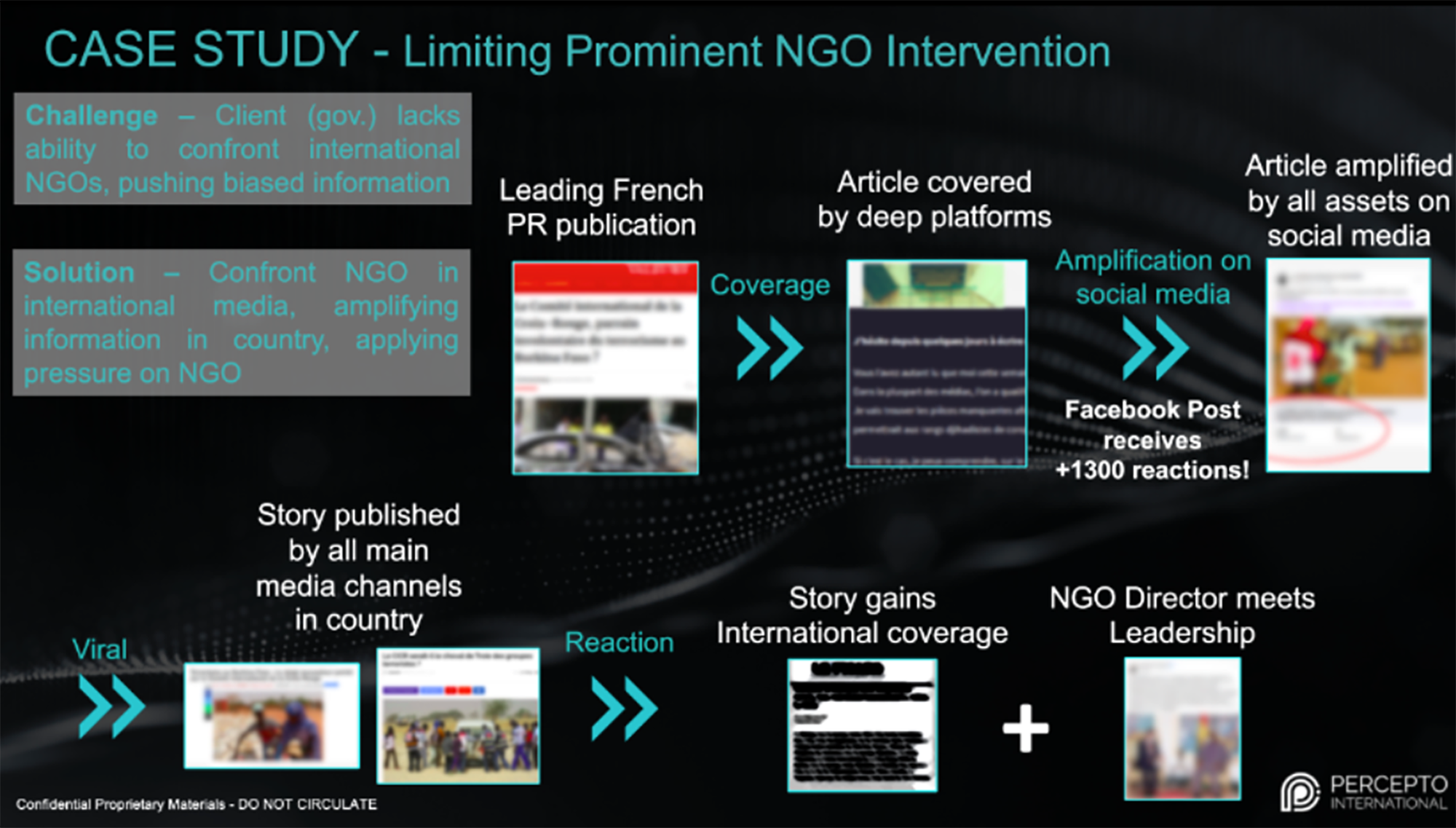
A screengrab of a presentation Percepto gave for the undercover #StoryKiller consortium journalists, explaining how it has used a combination of avatars, unwitting mainstream media, and social media manipulation to undermine the International Committee of the Red Cross in Burkina Faso, by planting suggestions that it was supporting jihadist terrorists in the country.
“We’re currently operating dozens of assets online, unattributed assets in Africa, in Francophone Africa… our secret sauce is the use of avatars for intelligence gathering… [our] online assets are able to communicate, to engage, with targets,” Percepto’s co-founder and CEO Royi Burstien boasted during a series of secretly recorded meetings with the consortium’s undercover reporters.
“A deep avatar,” he explained, “is someone, an online entity, who looks real [but] that is really not true. And, if one of our deep avatars engages with you, you’ll be certain that [it’s] a real person. We have been operating this specific investigative journalist for the past, uh, from 2019. She is French. She lives in Paris, [but] she’s an avatar of course…
“She’s already worked in three different countries, on three different projects. One project in France and two projects in two different countries in Africa. One Francophone, one Anglophone.”
Burstien claims Pettit was so effective she triggered retaliation.
“She published a piece attacking one of our clients’ opponents and we probably struck a nerve, because I think 24 hours after she published the piece, we had a cyber DDOS attack on [her] website. This was also picked up by a lot of cyber experts, and it gained huge traction on Twitter in France and in specific countries. [O]ver the past four years, she engaged with a lot of journalists, including from France, including, by the way, a lot of French-speaking journalists in the diaspora outside of France.”
Percepto offered to make Pettit available as a tool for our undercover reporters, who he thought were representing a potential major new client in Africa that wanted to undermine a commercial competitor.
The journalists were actually part of an initiative launched by the European non-profit Forbidden Stories, alongside major investigative media such as the Guardian, Le Monde, Haaretz, Der Spiegel and 26 others, to expose the inner workings of the global world of disinformation mercenaries. Code for Africa (CfA) is the only African member of the consortium.
Percepto offered to deploy the Pettit bot alongside other avatars that could help amplify whatever Pettit published.
Pettit’s digital backstory is elaborate, starting with heartfelt blogging about reconnecting with her African roots on her personal Ghanaland journal. She writes about busking in restaurants to save money to travel back to Ghana because, “I was born in France and I have a Ghanaian mother and a French father. Unfortunately, I did not really know my mom, who disappeared when I was very young. It’s hard to grow up without a mother by my side.”
Pettit writes that she’d been to Africa before, on a trip to visit her friend Sonia in Cameroon, but her “head and heart are with Ghana.”
Travelling to Ghana, Pettit was a little nervous because English isn’t her first language, and she had some concerns about poverty and security, but after a long trip (she hates when the layover is longer than the flight) she arrived in Accra and was immediately struck by the hospitality.
She appreciated that Sonia’s cousin, Souleman, welcomed her at the airport and helped her get to her hostel, the Sleepy Hippo, a well-reviewed, pet-friendly establishment with a pool on Duade Avenue in Kokomlemle, near the city centre.
Pettit enjoyed her time in the country, visiting Kejetia market to buy “various handicrafts, souvenirs from all over the country, glass beads, all kinds of wooden sculptures, batik fabrics and many other wonderful things”, and travelling out of the capital to visit Kumasi and Cape Coast.
Along the way, Pettit enjoyed a beer on the beach, until she spotted a boy who couldn’t be more than 12, drinking beer. Pettit was surprised and upset; shocked, even.
“If I just tasted beer at this age, my father would have killed me,” she wrote. But, she came to understand, “More I look at them, more I understand that they have to live by themselves. No law and no limit for them. Just one goal: live as they can.”
But none of this is real: not her dreams and hopes, not the revelations she’s had along the way on her journey, and definitely not her supposed belief in the truth.
The vast majority of the content on her investigative website is plagiarised from elsewhere, including leading French media such as Le Monde and Le Croix. The images on her personal blog from her travels are also edited versions of stock images from the Internet. Not even the profile photos on her social media on Facebook, Instagram and Twitter are real.

The Anita Pettit avatar used a web of related social media accounts and both personal and professional websites to create the impression of a fully-fledged online persona.
Percepto constructed Pettit by stitching together stolen photos from at least three different people. A reverse image search of her Facebook profile picture shows that the picture had similarities with one posted on Instagram by a model based in Los Angeles, Sydney Graham.
Pettit’s pose, clothing and the physical location are identical, but there is one big difference: the face. The facial features of the image have been changed and manipulated, presumably in an effort to evade detection or recognition by the original user.
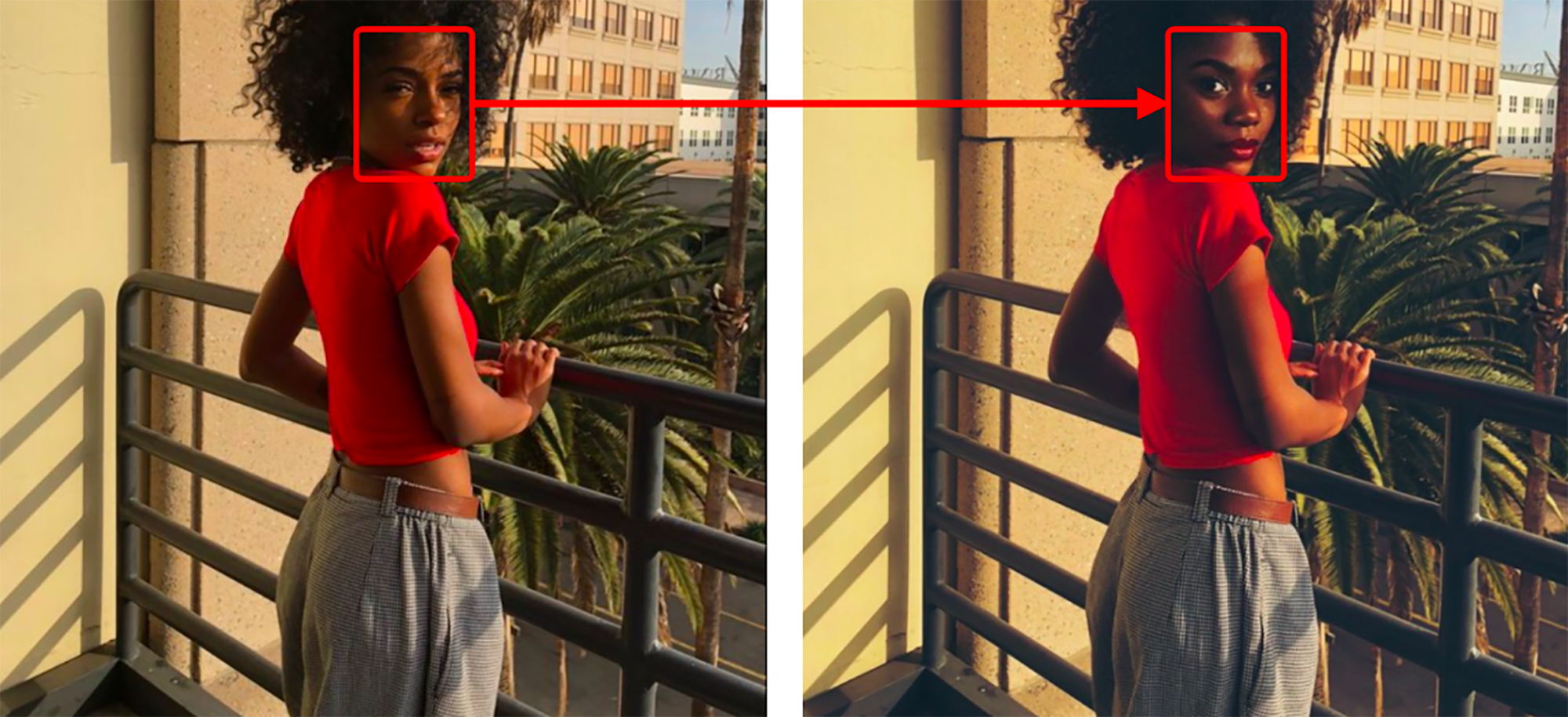
Percepto’s Anita Pettit avatar used an image of the body of US-based model Sydney Graham, grafting on a different face to mask the changes.
On her Twitter feed, Pettit wishes herself happy birthday, using another “body-double” cloned from another model, this time a Paris-based model, Sharon Alexie. It was modified and posted as Pettit, using a different face, along with adjustments to make the body colour slightly darker in tone.
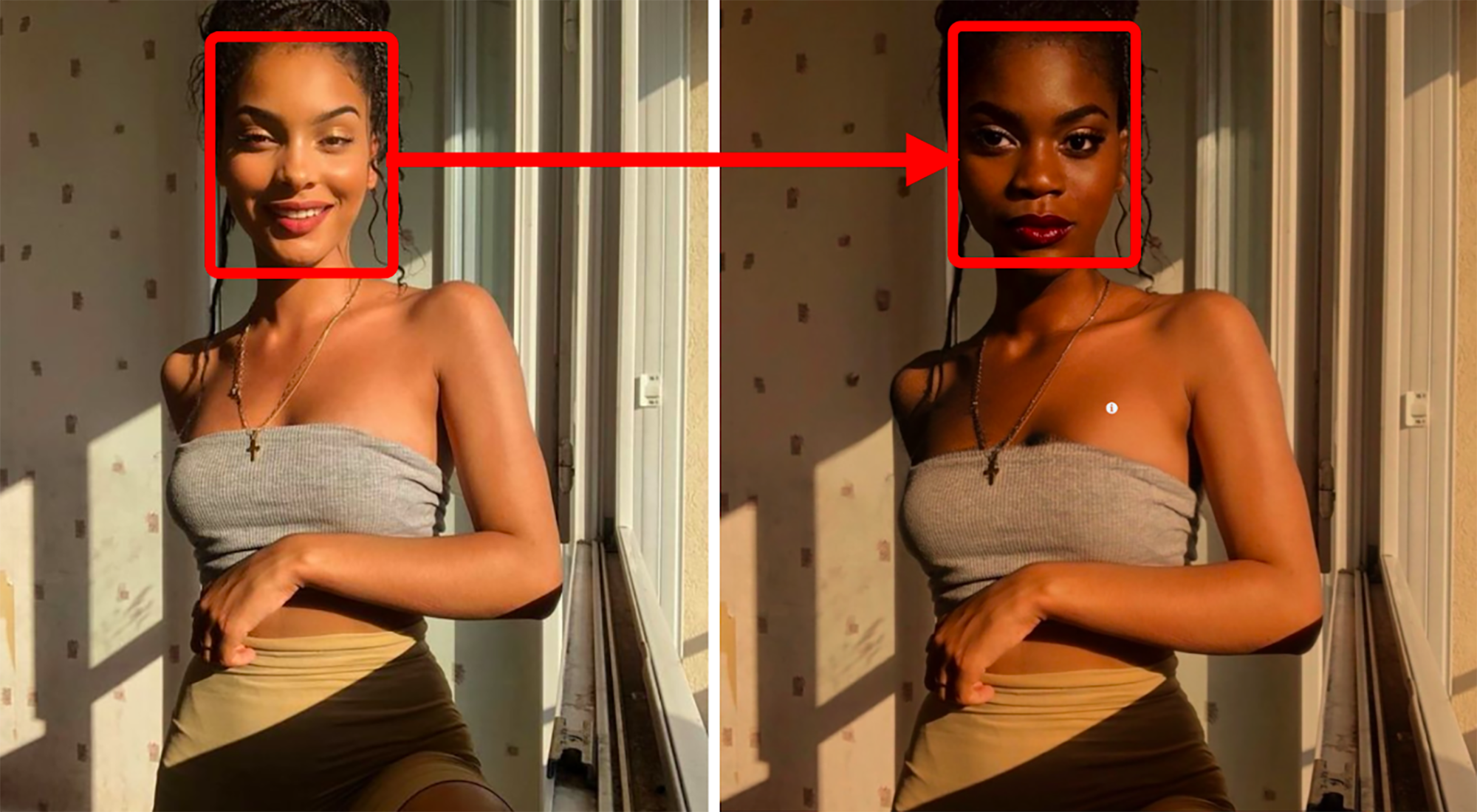
Percepto’s Anita Pettit avatar used a copy of an image of French model Sharon Alexie, adjusting the skin tone to be darker and with a different face grafted into the body.
A reverse search of the face used on Anita’s profile shows that the image originated from a Jamaica-born engineer, Sherry-Ann Wellington, currently working in Russia. In fact, most of the facial images used by Pettit originate from Wellington’s profile.

Percepto’s Anita Pettit avatar used the face of Jamaican engineer Sherri-Ann Wellington for its social media profiles.
Graham said she had never given Percepto or anyone else permission to use her image, and was not aware there was a doppelganger online. It was, she said, “weird and misleading”. Neither Alexie nor Wellington responded to multiple requests for comment.
Petitt’s profiles are being systematically removed by social media platforms after the #StoryKillers consortium alerted them to Percepto’s activities.
The takedowns include a network of 23 other similar avatars, including another supposed investigative journalist, Chloé Boyer, whose profile claimed they were based in Paris. Boyer’s image appears to have been stolen from an account on the Russian VK social media platform, claiming to be a user called Svetlana Kerdich, that posts porn and humour memes. The Kerdich profile image was in turn lifted from another VK profile for a real-world user, Anna Vihareva, based in the Siberian city of Tomsk.
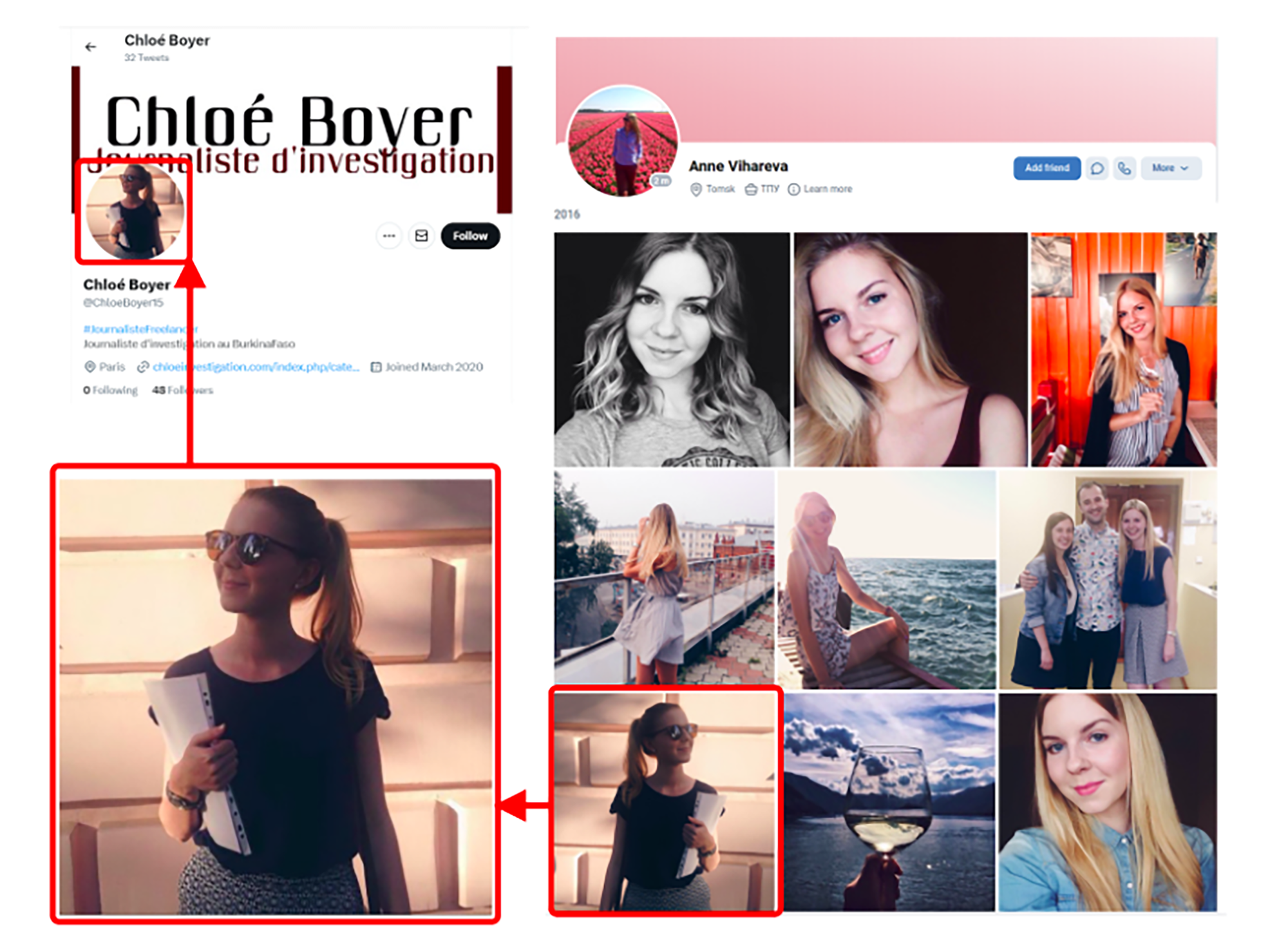
Percepto’s Chloe Boyer avatar’s profile image was lifted from a Russian VK user, Anna Vihareva.
Percepto also tried to obscure the origin of Pettit’s supposed travel photos on her personal blog, by cropping/cutting the original photos they lifted from the Internet, and then inverting the image so that it would not appear as a duplicate if anyone tried to Google or otherwise look for the image. The original images are, however, easy to trace using specialised anti-fraud tools.
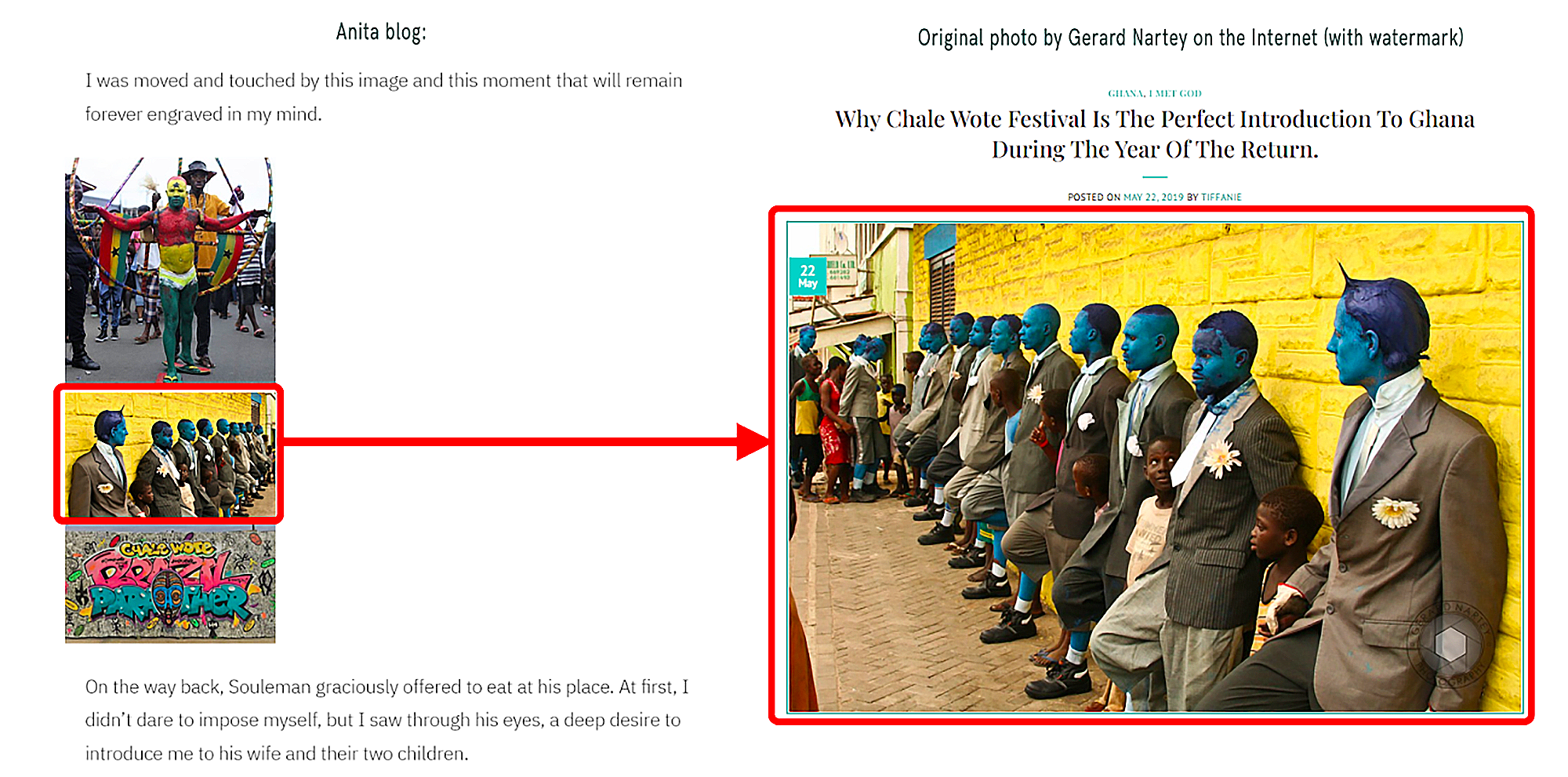
Percepto’s Chloe Boyer avatar’s profile image was lifted from a Russian VK user, Anna Vihareva.
But, why go to all the effort to create such elaborate backstories?
Burstien told #StoryKillers that social media platforms like Facebook use algorithmic defences to find and delete avatars that aren’t convincing enough. Percepto, he insisted, is one of the few companies to have created unique techniques for evading detection.
“We have avatar management systems and we have operational IP infrastructure [to] operate in Africa; in Cameroon. Senegal. Burkina Faso. After the Trump 2016 campaign, that’s when everybody started talking about unattributable avatars. That’s when it came to light. We’ve been doing this since 2013, 2014. And I think we’re one of the few companies that really has the longest track record in operating… for almost now over 10 years.”
Burstien, a former Israeli intelligence operative, was previously CEO of the Psy-Group, which worked with the Israeli state as well as clients across the Gulf region until it was closed in the wake of Robert Mueller’s investigations into Russian interference in the 2016 American presidential election.
And, because Percepto has been doing this for so long, some of the more complex avatars have built up years of “track record” across a wide variety of assignments, just like real humans.
Burstien uses the metaphor of wine to explain, saying: “The older the avatar, the better the avatar.” This, he adds, is why Percepto’s networks remain operational, even while those operated by countries like Russia are regularly detected and destroyed.
Percepto’s deep avatars don’t just publish propaganda or smear opponents. Burstein claims that the more advanced avatars are also used to recruit and manage unsuspecting humans: real-world journalists or political activists.
The #StoryKillers consortium filed a set of detailed written questions with Burstien and Percepto, focusing on their claims during the four meetings with our reporters. Percepto responded by saying that it does not disclose confidential information, and would neither confirm nor deny the identity of its clients.
It responded to a list of five questions about the avatars, including whether Percepto had created the Pettit bot or alternatively met/interacted with a real person by that name, with a single-word answer to each question: “No.”
When questioned specifically about the ICRC disinformation campaign in Burkina Faso, Percepto said “the content of your question is untrue, but we do not comment on alleged activities performed by the company”.
The use of fake persona on social media is widespread in the disinformation industry. Another Israeli company unmasked by the #StoryKillers consortium, Team Jorge (TJ), appears to operate sophisticated digital tools that control an army of 30,000 avatars, all with fake profiles on Twitter, Facebook, Gmail, Instagram and LinkedIn.
Some even have Amazon accounts with credit cards, Bitcoin wallets and Airbnb accounts. TJ is also led by former intelligence officers.
#StoryKiller partner newsroom, the Guardian, explains that TJ’s toolkit, marketed as the Advanced Impact Media Solutions, or AIMS, controls fake social media profiles on an industrial scale to spread client’s propaganda at speed.
Unlike Percepto’s more targeted avatars, the TJ bots are used for coordinated comments or mass sharing of content. The campaigns driven by the bots appear to be mostly commercial disputes in about 20 countries, including the UK, US, Canada, Germany, Switzerland, Greece, Panama, Senegal, Mexico, Morocco, India, the United Arab Emirates, Zimbabwe, Belarus and Ecuador.
Twitter has suspended 1,775 accounts in the wake of #StoryKillers’ coverage, but has declined to comment on questions from the consortium. Meta, the owner of Facebook, also took down AIMS-linked bots on its platform after reporters shared a sample of the fake accounts with the company.
A Meta spokesperson connected the AIMS bots to others that were linked in 2019 to another, now defunct, Israeli firm which it banned from the platform.
“This latest activity is an attempt by some of the same individuals to come back and we removed them for violating our policies,” the spokesperson said.
“The group’s latest activity appears to have centred around running fake petitions on the Internet or seeding fabricated stories in mainstream media outlets.” DM
Additional research and analysis by CfA’s iLAB researchers Reinach Krynauvić in South Africa, Allan Cheboi & Ivan Musebe in Kenya, Eliud Akwei in Ghana, & Khatab Hammad in Sudan.
_______________________________
Target: International Committee of the Red Cross
Shadow games: using innuendo to smear humanitarian organisations
Percepto engineered an elaborate smear campaign against the International Committee of the Red Cross (ICRC) in 2020, using influential right-wing media in Europe to ask whether it was the “godfather” and “involuntary Trojan horse of terrorism in Burkina Faso”.
An opinion piece published in French far-right magazine, Valeurs Actuelles, partly relied on secret recordings of conversations ICRC employees allegedly had with members of armed terrorist groups to gain access to parts of the country. The magazine presented the ICRC’s approach as a “compromise” and said an ICRC employee had “provided food supplies to terrorists”.
Coming just six months after the ICRC had publicly criticised the Burkina Faso government in a report condemning arbitrary killings of civilians by military forces during unrest in the north of the country, the Valeurs Actuelles article was widely circulated by the Burkinabe press, including, le Faso.net and Burkinfo24, and triggered a fierce anti-ICRC reaction on social media.
Israeli influence-for-hire company, Percepto, boasted in a series of meetings with undercover reporters from the #StoryKillers investigative consortium that it planted the Valeurs Actuelles article, on behalf of a government client, to discredit the ICRC.
Spotlighting the disinformation campaign as a “case study” of the kind of services it offered, Percepto CEO Royi Burstien used a step-by-step diagram on a company-branded slide to show how they’d done it.
“Our client had a real problem with a specific NGO that really was not really objective,” Burstien explained. “So the question is, how do you get this NGO out of the ball game?
“First thing is [to] obtain intelligence… We obtained really good intelligence. We understood that if we published this information in [the] local media, it [wouldn’t] resonate. We worked with tier-one French media… The process took over a month for them to validate the information.
“Immediately after they published it… we took it and published it within our assets.”
Once the inflammatory allegations had been planted, Percepto sat back and allowed existing anti-French and pan-Africanist activists on social media to drive public outrage.
Two of the key social media accounts, “Les Analystes Du Faso” and “Burkina On Line”, that participated in the amplification, are pro-Russian advocates that regularly share fake content designed to undermine international agencies like the United Nations and ICRC in support of arguments for the Wagner Group private military company’s activities in the region.

Screengrab of two Facebook pages that shared the ICRC article and are also linked to pro-Russian campaigns in Africa.
“The article [provoked] violent comments online and [caused] fears for the safety of our teams in Burkina Faso,” Patrick Youssef, ICRC director for the Africa region, told the #StoryKiller consortium’s lead researchers at Forbidden Stories.
While the Valeurs Actuelles article was shared in Burstien’s presentation, the ICRC’s logo was blurred in the slide itself. Percepto viewed the results of its campaign as a major success, with Burstien saying “the leader of the NGO flew over to the country, [had] a meeting with the client, and more or less said, ‘I made a mistake, I’m backing off’”.
Burstien and Percepto have both since refused to answer follow-up questions about the operation or who the client was, but #StoryKillers has been able to confirm that ICRC president, Peter Maurer, met with then president of Burkina Faso, Roch Kaboré, one month after the Valeurs Actuelles article was published.
He also used a press conference in Ouagadougou to explain the ICRC’s role during conflicts, saying “we hold dialogues [with armed groups] not to please or to give any legitimacy to armed groups or to a government. We do it out of necessity, out of humanitarian need”.
Kaboré has failed to respond to a series of questions sent to him and a number of his aides/associates.
Read the full #StoryKillers investigation here. DM


















 Become an Insider
Become an Insider
Outstanding journalism here, thank you. And thankfully I know you are real.
That they are exposed shows they are not half as clever as they think they are. Great investigative journalism.
Scary thought : how much out there is as fake as Anita Pettit? I’ve always emphasized to our kids the importance of sticking with trusted media and research. Even if not specifically bad actors like these clowns, there is so much stuff that is specifically written so as to distort facts.
The classic vaccine conspiracy one doing the rounds at the moment is that vaccinated people are the majority of covid deaths. The fact is true, but what it fails to point out is that the deaths per 100,000 of nonvaccinated people is multiples of the deaths per 100,000 of vaccinated. Selective truths are as dangerous as outright fake news.
Very interesting that Royi Burstien and PsyGroup, “reborn” as Percepto International after PsyGroup was exposed, pop up again in the media here. A few years back, PsyGroup was responsible for an elaborate misinformation campaign against the leaders of the faith community that I belong to, with headquarters in Norway. This fact just happened to come to light in a New York Times article by similarly hard-working investigative journalists as yourselves. It’s a long story, but if you’re interested, there’s a booked called “Ytringskamp eller statsfinansiert mobbing?” by Dag Christensen (translated loosely as “Freedom of expression or state-funded bullying?”) that has just been released about the whole saga and how PsyGroup used, amongst others, the Norwegian news media to spread their disinformation (something Daily Maverick really needs to look out for if they are going to remain a reliable source of news). The book is in Norwegian and available in PDF or ePub for free, so translating it using Google translate or ChatGPT should be easy. I believe the case study described in this book will be a very valuable contribution to the debate regarding freedom of speech and media freedom going forward.